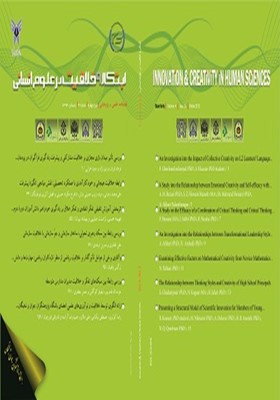Examining Effective Factors on Mathematical Creativity from Novice Mathematics Learners’ Point of View: Mathematical Knowledge and Skills, and Personality Characteristics
Subject Areas : Creativity and innovation from psychological, epistemological, educational and pedagogical
1 - استادیار گروه ریاضی دانشگاه تربیت دبیر شهید رجایی yaftian@srttu.edu
Keywords: Grounded theory, Mathematics Education, personality characteristics, Mathematical creativity, Mathematical knowledge and skills,
Abstract :
Background: Creative mathematical activities as the sophisticated activities need rich knowledge and skills and personality characteristics. In order to identify these mathematical knowledge and skills and personality characteristics, it is necessary for mathematics educator to do research which leads to formulating fundamental theories through considering society’s contextual features. One of the necessary steps in this regard is doing qualitative research. Objectives: This study tried to identify the mathematical knowledge and skills and personality characteristics which are involved in creative mathematical activities and that how they influence on these activities. Methods: To do so, qualitative research based on grounded theory is served for data collection and analysis. The instrument for data collection in the present study is introspective semi- structured interviews. In this study MAXQDA9 software is used for data analysis. The population is all students who are majoring in mathematics in one of the universities in Tehran. For the semi-structured introspective interviews, some 13 mathematics students were asked to participate in the study based on purposive sampling. The data was analyzed by coding process in the two stages of free and axial coding. To ensure that the research is qualified, the credibility, dependability, transferability and conformability criteria were used. Results: The results reveal, there are several sub-categories for both of these mathematical knowledge and skills and personality characteristics categories that explain how they influence on the creative solutions of the mathematics problems. Conclusion: Hoping that educational systems and education professionals explain the teaching-learning process more accurately based on scientific findings and provides an environment which the learners face challenging situations and problems and provide the context for the advancement of creativity, while struggling for solving these problems. The results could help the educators to provide appreciate educational environments which can develop mathematical creativity.


